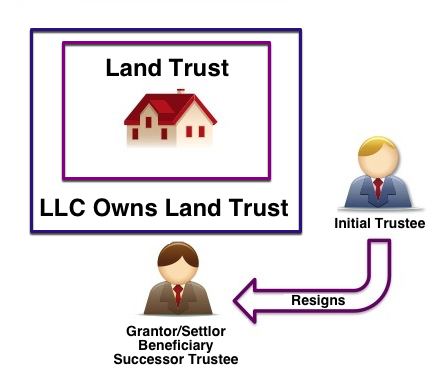

LAND TRUST & REAL ESTATE

A land trust can be a very useful tool in real estate planning and investing, but not many attorneys or CPAs may be familiar with this entity. Land trusts are only recognized by statute in just a handful of states. That means that only a handful of states like Hawaii, Illinois, Indiana, Florida, Georgia, Montana, South Dakota, or Virginia have a law on the books that recognize this type of trust. Even if your state does not have a statute recognizing a land trust, you can still gain the same benefits by transferring your property to a living (revocable) trust. Unlike an LLC or other corporate entity, a land trust does not have to be assigned to a particular state or jurisdiction. A land trust acts like any other grantor trust. There are many types of grantor trusts, like living trusts and personal property trusts. These grantor trusts shift the title of property out of one person’s name and into the care of a trustee. The trust agreement, at the creation of the trust, is the governing instrument between the trustee and the beneficiary. In forming a land trust, three basic parties are involved: the grantor, the trustee, and the beneficiary.
- The Grantor
The grantor is the person who forms the trust and transfers assets into the trust is known as the grantor. The grantor can fund assets into the trust, and the trust can control those assets right away. The grantor usually remains the beneficiary of the trust for his or her lifetime.
- The Trustee
The trustee is the person who manages the trust. Usually, the grantor appoints a trustee, (a third-party) who has specific instructions and actual duties in managing the trust.
- The Beneficiary
The beneficiary is usually the grantor, the person who receives the benefits of the trust. The beneficiary has actual ownership of the property and holds equitable title.
- How Much Does It Cost to Set Up a Land Trust?
The first thing to consider when forming a land trust is the state’s law. Currently, only eight states in the US have statutes on land trusts. The rest follow common law. Therefore, land trust formation is very complex and depends on the state. A land trust must be formed in accordance with the particular state’s laws or common laws. Using an experienced attorney can ensure that the land trust is set up properly to ensure its intended purpose will be carried out. Therefore, the cost of an experienced attorney should be factored in. Attorney pricing can vary depending on location and level of expertise. Beware of online programs where you can write the trust document yourself. Although you may be saving some money upfront, it may be more expensive in the long run if the trust documents are not written or executed correctly. Usually, these problems aren’t discovered until the estate or owner is subject to a lawsuit.
Topics: Land Trust, Real Estate Laws, Investment
Work cited: David Gass, Anderson Business Advisors, June 09, 2020




Comments